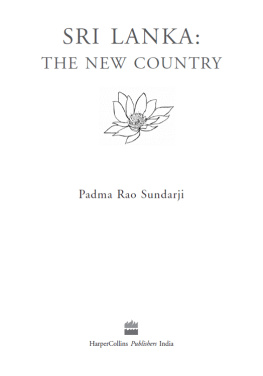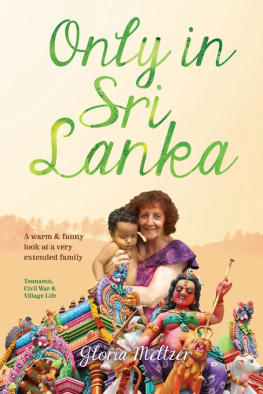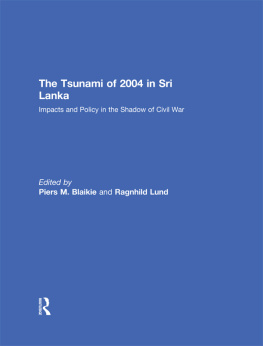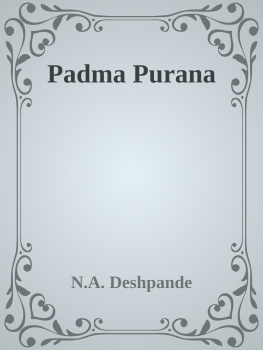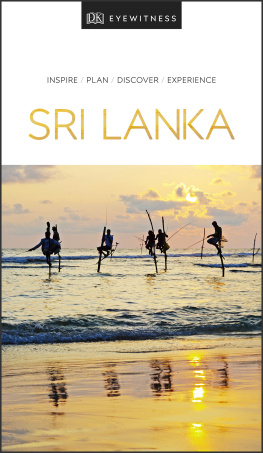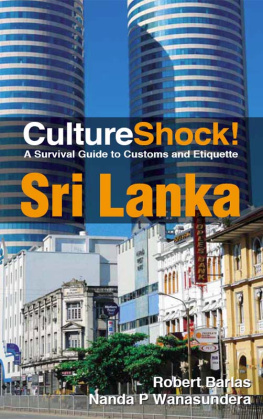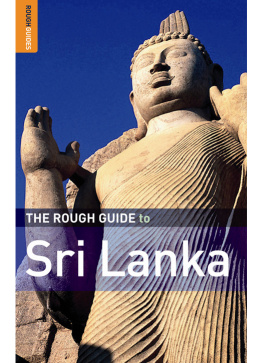Padma Rao Sundarji - Sri Lanka: The New Country
Here you can read online Padma Rao Sundarji - Sri Lanka: The New Country full text of the book (entire story) in english for free. Download pdf and epub, get meaning, cover and reviews about this ebook. year: 2016, publisher: HarperCollins Publishers India, genre: Politics. Description of the work, (preface) as well as reviews are available. Best literature library LitArk.com created for fans of good reading and offers a wide selection of genres:
Romance novel
Science fiction
Adventure
Detective
Science
History
Home and family
Prose
Art
Politics
Computer
Non-fiction
Religion
Business
Children
Humor
Choose a favorite category and find really read worthwhile books. Enjoy immersion in the world of imagination, feel the emotions of the characters or learn something new for yourself, make an fascinating discovery.
- Book:Sri Lanka: The New Country
- Author:
- Publisher:HarperCollins Publishers India
- Genre:
- Year:2016
- Rating:3 / 5
- Favourites:Add to favourites
- Your mark:
- 60
- 1
- 2
- 3
- 4
- 5
Sri Lanka: The New Country: summary, description and annotation
We offer to read an annotation, description, summary or preface (depends on what the author of the book "Sri Lanka: The New Country" wrote himself). If you haven't found the necessary information about the book — write in the comments, we will try to find it.
Sri Lanka: The New Country — read online for free the complete book (whole text) full work
Below is the text of the book, divided by pages. System saving the place of the last page read, allows you to conveniently read the book "Sri Lanka: The New Country" online for free, without having to search again every time where you left off. Put a bookmark, and you can go to the page where you finished reading at any time.
Font size:
Interval:
Bookmark:
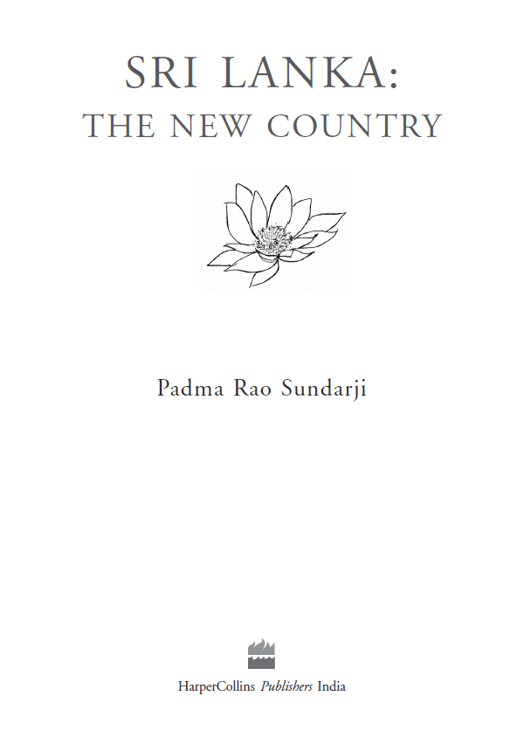

| 1. |
| 2. |
| 3. |
| 4. |
| 5. |
| 6. |
| 7. |
| 8. |
| 9. |
| 10. |
| 11. |
| 12. |
| 13. |
| 14. |
| 15. |
| 16. |

All journalists who report on a large region begin to focus on one country or issue, either because the medium they work for is most interested in one particular story or because they develop a personal fascination and insatiable curiosity for it.
In my case, it was both. Of all the conflicts and subjects I had covered, Sri Lanka emerged as that one story.
Though I started writing for the German magazine and focusing even more on Sri Lanka in 1998, my earlier jobs under veterans in the international media had already sown the seeds of interest. But it was when I began to head the South Asia bureau of the Hamburg-based publication that my real and long engagement with Sri Lanka began.
Since Sri Lanka was in the throes of an almost thirty-year-long civil war, one of the bloodiest in the world and the one that ended only in 2009, the conflict between the armed LTTE (Liberation Tigers of Tamil Eelam), who were fighting for a separate state for the countrys minority Tamils in the north and east of the country, and the Sri Lankan government was, of course, both my primary focus as well as that of the publication.
For two decades of the war, I reported out of Sri Lanka over and over again. I travelled in the war zone, fearingas a single parent landmines and sniper attacks, meeting presidents and prime ministers, Tamil and Sinhalese human rights groups, Tamil politicians, Norwegian peace envoy Erik Solheim, his successor Jon Hanssen-Bauer, Scandinavian war monitors, expatriate aid workers with the Red Cross, various bodies of the United Nations, Buddhist monks, Tamil and Sinhalese chauvinists, Muslim liberals, and Burgher intellectuals among others.
From LTTE chief Velupillai Prabhakaran down, I met scores of Tamil rebels both of the LTTE and other groups. The erstwhile ones who had thrown in the towel and joined mainstream politics, like Douglas Devananda and the more newly defected commanders like the LTTEs Vinayagamurthy Muralitharan aka Colonel Karuna.
I had travelled through and reported non-stop for TV and print on the frightening vistas of the first forty-eight hours of the tsunami, which, after a brief fragile peace and lull in fighting, had devastated the country yet again, bringing fresh sorrows in its demonic wake.
Just a year later and on the evening that Lakshman Kadirgamar by far the most erudite foreign minister the country has ever had was assassinated by the LTTE right beside his swimming pool in the heart of Colombo, I realized with a sense of gloom back in New Delhi that my chat with him the week before, and not far from the same spot in his house, had been his last with any journalist.
It will take just one more killing spree by the LTTE, he had warned, even as the ceasefire and the fragile peace were just about holding. And its back to war.
His dire prognosis came true and the civil war entered its worst and final phase thereafter.
Finally, I also met and was in touch with sources in Oslo about the fate of the last of the LTTE leaders towards the end of the bloody war in May 2009: LTTE peace secretariat chief Puleedevan, its police chief Nadesan, and the ideological founder and tyrant who headed the organizationVelupillai Prabhakaran himself.
I had met all these Tigers in their de facto capital, Killinochchi, even earlier, i.e., during the brief fragile peace seven years before they were killed, allegedly by the army, and some, even as they surrendered with white flags after three-way negotiations between Colombo, Oslo and the LTTE.
All reporters make similar experiences. So, who am I and what are my credentials to write a book on Sri Lanka?
I am neither an Indian Tamilian, nor do I have any Sinhalese relatives or genes. I am an Indian of Andhra genetics that go back to forefathers who had lived in the long-gone Madras Presidency. But for that, I am a naturalized north Indian.
My primary language is English, German is my second best language. Hindi is the only Indian language I can speak, read and writefluently, I like to claim. I can produce smatterings of excruciatingly bad Tamil and passable Telugu andenough French to save my life.
My father, a military doctor, had spent most of his time in army hospitals on Indias northern fronts. I grew up entirely in New Delhi, interspersed with study and work in Europe and the United States.
And yet, there is an invisible thread that connects me to Chennai, the city of my birth, the only brief timea week or soI ever lived in southern India (when my mother took the traditional route of going home to her parents place to deliver a baby).
For some years, Chennai remained the venue for the annual summer school vacation, to catch up with other cousins congregated from different parts of the country at our grandparents sprawling home in Mambalam.
And given that Chennai was my only contact point with southern India, on the odd occasion I feel south Indian, it is usually more Tamilian than Andhra. (It may have been even more intense had the Tamil Iyengar-Iyer army family I eventually married into been less anglicized themselves).
Even if I am in Chennai only for a day, the redolence of jasmine and afternoon coffee beans being ground in small shops on Ranganathan Street, the melody of Nadaswaram, the performances at the Krishna Gana Sabha and the ripe smell of jackfruit and killi manga still evoke great nostalgia.
Those early years are one of two links that got me especially interested in the Sri Lankan conflict between the Tamil minority and the Sinhalese majority.
The other is Sundaramma, my grandmother, long deceased.
When my grandfather, a chemical engineer, was sent to Paranthan in northern Sri Lanka (close to Elephant Pass) in the late 1950s to help set up a factory, she had accompanied him.
They spent three years there, during which my linguist grandmother who was excellent in Tamilwhich she wrote and read avidlyeffortlessly added fluent Sinhala to her repertoire.
In the afternoons of my summer vacation, the caustic old lady who frightened everyone except me, would enthrall me with stories of Ceylon.
Font size:
Interval:
Bookmark:
Similar books «Sri Lanka: The New Country»
Look at similar books to Sri Lanka: The New Country. We have selected literature similar in name and meaning in the hope of providing readers with more options to find new, interesting, not yet read works.
Discussion, reviews of the book Sri Lanka: The New Country and just readers' own opinions. Leave your comments, write what you think about the work, its meaning or the main characters. Specify what exactly you liked and what you didn't like, and why you think so.

